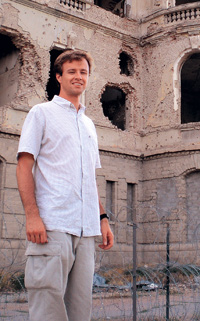| |
 |
| |
John
Schweiger '03 |
| |
|
Alumni
Profile: John Schweiger '03
Management
expert fights counterinsurgency with better plan
By
Aubrey Henretty
"I
came to be considered a counterinsurgency expert mostly by
learning it on the ground," says John Schweiger '03,
a strategic planner for the U.S. Department of State. After
three years in Afghanistan, Schweiger is drawing on his hard-won
experience to give future government and military leaders
a powerful insurgent-fighting tool he never had: a cohesive
plan.
Schweiger,
who spent four years in the U.S. Marines before coming to
Kellogg, began work for the U.S. Agency for International
Development (USAID) in Afghanistan in December 2003. The Taliban
had fallen quickly after the U.S. attack in 2001 and President
Hamid Karzai had been running the transitional government
since 2002, but the nation lacked critical infrastructure
in healthcare, education and national governance.
As
a field officer for Nangarhar Province, Schweiger met with
the province's governor and citizens and advised the local
military commander. He worked alongside former professional
development officers with highly specialized knowledge, but
little sense of how to coordinate with other organizations
— especially the military. "These were great technical
people," he says, "but they just weren't managers."
Within eight months of his arrival, Schweiger was asked to
organize them, to become the manager they needed.
As
he tried to bridge the gap between aid workers, policymakers
and average Afghans, Schweiger was also dodging violent insurgents.
In early 2004, he says, he was a passenger in a truck blasted
with an improvised explosive device. The explosion wrecked
the truck, but the passengers all walked away without any
serious injuries. "They guy who blew it up was pretty
incompetent. He detonated it too soon." It is a testament
to Schweiger's high standard of "competence" that
he adds nonchalantly, "If he'd waited one more second,
he would have killed us all."
Soon,
Schweiger became the civilian development adviser to Regional
Command East, the military unit responsible for 16 of Afghanistan's
provinces and a third of its population.
Searching
for the right words to describe the task at hand, Schweiger
settles on a business term: "We have a much better value
proposition than the Taliban."
No
one in Afghanistan longs for the days when such heretical
activities as sending girls to school and flying kites were
punishable by death, he says. Even so, it can be difficult
to get local populations to embrace the official government
and report insurgent activity. Fear of retribution and corrupt
law enforcement keep many peace-loving citizens from speaking
out.
"We're
trying to create a situation in which the people can see that
supporting the constitution and the Karzai administration
is very much in their best interest," Schweiger says.
In addition to identifying and quashing police corruption,
he explains, it is important for any counterinsurgency team
to strengthen and build trust among local communities.
"If
you have to fight the enemy," the Kellogg grad says,
"you're losing. You have to get the community to reject
the enemy."
Schweiger
left Afghanistan and USAID in June 2006 to join the Department
of State, where he's translating the lessons he learned in
Afghanistan into a handbook and developing a comprehensive
strategy for the United States to use in future counterinsurgency
and stabilization missions.
"There
is no greater management challenge than making a public-sector
entity work," he says, noting that "bureaucratic
inertia" frequently resists oversight and change. "We
need to have an institution that's responsible for accomplishing
a mission. It's not like a company, where you either learn
[from your mistakes] or go out of business."
Though
the goals — to help people cast off their would-be oppressors
and bring lasting peace to former war zones — are lofty,
Schweiger's focus remains on the practical and the proven.
"It's not just the things we're doing," he says.
"It's how we structure ourselves to get them done." |



